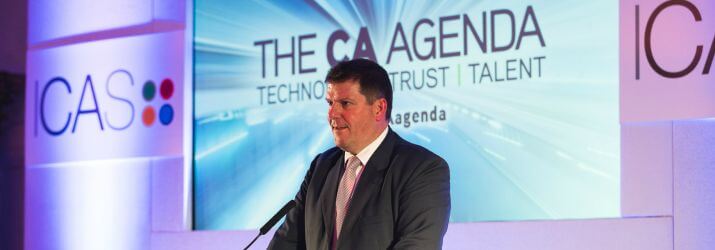
Bruce Cartwright, Chief Executive, ICAS
Last year I had the opportunity to meet and talk to Bruce Cartwright shortly after he took the reins as Chief Executive of ICAS.
This week, as I find myself writing about what it takes for successful Collaborative Leadership, the theme of Trust comes around again and again.
Also this week, Bruce and ICAS launched the ICAS agenda, with one of their three themes being Trust.
A while ago I wrote in: “What makes Scots different ?” :
“Scots are known the world over, and for centuries, for being of Integrity, having a high standard of Ethics, and, to summarise, being people you can TRUST.”
When I met Bruce Cartwright last year I told him that I felt that the single most powerful asset ICAS has in their brand is their unerring and strong focus on Ethics, so resulting in a worldwide membership in the tens of thousands who are known for being professionals that one can trust.
ICAS is the abbreviation for the Institute of Chartered Accountants in Scotland, a body I have been a member of for 30 Years. Though I joke that I am a “recovering accountant” and have not worked as an accountant for decades, the power of the ethical focus of ICAS is really strong for me, being someone who has the value of Fair at my core as a human being.
Now, ICAS is an unsung export success for Scotland, with several of the largest accounting global accounting firms choosing to train large numbers of people outside Scotland through ICAS so extending “what makes Scots different?” to “what makes Scots trained professionals different?”
The ICAS Agenda and Trust
This week, in launching the ICAS Agenda around Technology, Trust, Talent, Bruce Cartwright wrote this piece on their site, and I highlight some excerpts:
“..There is another fork in the road: the decline of trust in government and business.
I have mentioned the results of the Edelman Trust Barometer before, but they are worth repeating: 46% of the public said they believe the system is failing them.
ICAS member David Nussbaum, Chief Executive of The Elders and Deputy Chair of the Board of the International Integrated Reporting Council, was the second of our CA Agenda launch speakers. David made the point that there is a crisis of trust in the system and it is up to us to do something about it.
I think this goes beyond resolving structural defects in the system. If we look at all the recent ongoing activity to modernise the audit environment in the UK then it will fail if we don’t properly define the purpose of an audit and its relevance in the modern age. The system must work for all and we need to be careful it is not self-serving.
David identified two key components that make accountants trustworthy in the eyes of the public: capability and behaviour.
At times both of these will be tested and it is then that we must take personal responsibility and choose a path of ethical leadership. This is at the heart of being a CA and it will remain.
But in a world of fake news and 10-second soundbites, in which reputations can be made or broken by a 280-character tweet, we must work hard to convey our message: the desire to do better in the interest of the public.”
I highlight the parts in bold from Bruce. Yes, capability is vital for trust, yet behaviour more so. It is in holding to ethics above all that is the source to trust. Bruce and I realised when met that we both qualified as ICAS CAs in the same class. I know we both are and have always been proud of that choice and live the commitment to Trust that is so intrinsic to being a member of ICAS.
